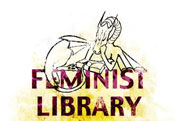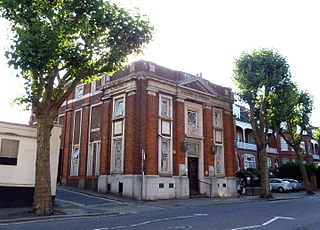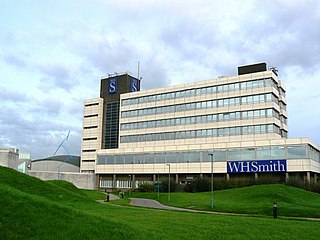 W
WJohn Bell (1745–1831) was an English publisher. Originally a bookseller and printer, he also innovated in typography, being responsible for an influential font that omitted the long s. He was also noted for drawing the reading public to "the best literature" by commissioning attractive art work to accompany the printed work.
 W
WThe British Library is the national library of the United Kingdom and the largest library in the world by number of items catalogued. It is estimated to contain 170–200 million-plus items from many countries. As a legal deposit library, the British Library receives copies of all books produced in the United Kingdom and Ireland, including a significant proportion of overseas titles distributed in the UK. The Library is a non-departmental public body sponsored by the Department for Digital, Culture, Media and Sport.
 W
WThe Dana Library and Research Centre on Queen's Gate, South Kensington, London is part of the Science Museum.
 W
WThe Feminist Library was founded as the Women's Research and Resources Centre in 1975 by a group of women concerned about the future of the Fawcett Library to ensure that the history of the women's liberation movement survived. The founders included feminist academics like Diana Leonard and Leonore Davidoff.
 W
WThe Grosvenor Gallery Library was a circulating library in London in the late 19th century. It was affiliated with the Grosvenor Gallery of art on Bond Street, later moving to South Molton Street. It offered subscribers current periodicals, new books, and a Ladies' Reading Room. Owners and staff included Miss Brinstingl, Coutts Lindsay, Mrs. A.W. Pollard, and Thomas Verrinder.
 W
WThe House of Commons Library is the library and information resource of the lower house of the British Parliament. It was established in 1818, although its original 1828 construction was destroyed during the burning of Parliament in 1834.
 W
WThe House of Lords Library is the library and information resource of the House of Lords, the upper house of the Parliament of the United Kingdom. It provides Members of the House and their staff with books, Parliamentary material and reference and research services.
 W
WIdea Store is a chain of educational community centres in London, England, that offer library services along with adult learning courses and extensive activities and events programmes. The project was initiated in 1999 by the Borough of Tower Hamlets. The centres present public programmes such as dance classes, computer classes, libraries, and medical clinics. The spaces are usually located on blocks with high foot traffic.
 W
WCentral Library is the main academic and research library of Imperial College London. The current library opened in August 1969, taking over from the original Lyon Playfair Library which had opened in 1959. The collection grew out of earlier libraries of the various departments and colleges, the oldest collection of which dates back to 1845. Central Library is the largest of the 7 libraries at Imperial with its collection covering all of the college's research departments, forming the main reference library for the college. It is situated on Queen's Lawn next to Imperial College Road, and across from Queen's Tower.
 W
WThe London Library is an independent lending library in London, established in 1841. It was founded on the initiative of Thomas Carlyle, who was dissatisfied with some of the policies at the British Museum Library. It is located at 14 St James's Square, in the St James's area of the City of Westminster, which has been its home since 1845. Membership is open to all, on payment of an annual subscription, and life and corporate memberships are also available. As of March 2015 the Library had 6,708 members.
 W
WThe Shaw Library, or the Founder's Room, is a general-purpose library and a common room at the London School of Economics and Political Science. Located on the sixth floor of the Old Building, the library is accessible to all members of the university. It was founded by and named after Charlotte Payne-Townshend Shaw, wife of the playwright George Bernard Shaw.
 W
WCharles Edward Mudie , English publisher and founder of Mudie's Lending Library and Mudie's Subscription Library, was the son of a second-hand bookseller and newsagent. Mudie's efficient distribution system and vast supply of texts revolutionized the circulating library movement, while his "select" library influenced Victorian middle-class values and the structure of the three-volume novel. He was also the first publisher of James Russell Lowell's poems in England, and of Emerson's Man Thinking.
 W
WThe Muswell Hill Library is a grade II listed building in Queens Avenue, Muswell Hill, London.
 W
WThe National Art Library (NAL) is a major reference library, situated in the Victoria and Albert Museum (V&A), a museum of decorative arts in London. It is freely accessible to the public from Tuesday to Saturday, and specialises in material about the fine and decorative arts of many countries and periods. It also contains substantial sources for information about artists. In the past, the NAL operated a restrictive admissions policy and was known as a library of last resort but that has since changed, as nowadays everyone is welcome to use the library and its collections.
 W
WThe National Central Library was a library at 14 Store Street, London W.C.1, in the 20th century. It was a tutorial system and a scholarly library for working people who were not connected to an academic institution. The founder of the library was Albert Mansbridge.
 W
WThe National Poetry Library is a free public collection housed at Royal Festival Hall in London's Southbank Centre. Situated on the fifth floor of the Royal Festival Hall, overlooking the river Thames, the library aims to hold all contemporary UK poetry publications since 1912. It houses the largest collection in Britain, numbering over 200,000 items, including works by small presses. It also holds audio and video materials, critical texts and works for children for loan and reference.
 W
WThe Polish Institute and Sikorski Museum, known as Sikorski Institute, named after General Władysław Sikorski, is a leading London-based museum and archive for research into Poland during World War II and the Polish diaspora. It is a non-governmental organisation managed by scholars from the Polish community in the United Kingdom, housed at 20 Prince's Gate in West London, in a Grade II listed terrace on Kensington Road facing Hyde Park. It is incidentally part of the same Victorian development by Charles James Freake as the nearby Polish Hearth Club. Although the Institute is closer to the commercial centres of Kensington, it is just within the City of Westminster. In 1988 it merged with the formerly independent Polish Underground Movement (1939-1945) Study Trust -.
 W
WWHSmith PLC is a British retailer, headquartered in Swindon, Wiltshire, which operates a chain of high street, railway station, airport, port, hospital and motorway service station shops selling books, stationery, magazines, newspapers, entertainment products and confectionery.
 W
WSt. Pancras Library is in the London Borough of Camden located just off the Euston Road in the King's Cross area of the borough. It is situated on the ground floor of Camden Council's Town Hall complex. With a separate children's library it provides a wide selection of books, CDs and DVDs available to borrow, and free internet access, making it central to provide a library service and gateway to other Council services to the local community.
 W
WThe Wellcome Library is founded on the collection formed by Sir Henry Wellcome (1853–1936), whose personal wealth allowed him to create one of the most ambitious collections of the 20th century. Henry Wellcome's interest was the history of medicine in a broad sense and included subjects such as alchemy or witchcraft, but also anthropology and ethnography. Since Henry Wellcome’s death in 1936, the Wellcome Trust has been responsible for maintaining the Library's collection and funding its acquisitions. The library is free and open to the public.